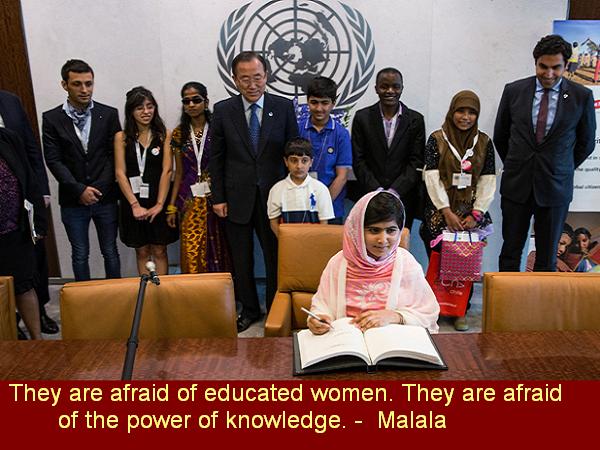By John Kerry, Secretary of the State
Washington, D.C., Oct. 11, 2014, –As we celebrate International Day of the Girl, I congratulate Malala Yousafzai of Pakistan who has been awarded the Nobel Peace Prize. As a recipient of one of the world’s highest honors, Malala’s resilience and courage challenge us all to support the struggle against brutality, ignorance, and violence. She inspires hope in millions of people and embodies our commitment to human rights and education.

Malala with UN Secretary General Ban Ki-Moon in 2013(file photo).
International Day of the Girl reminds us of the need to recommit to investing in the world’s 850 million girls so that they can use their talents to contribute to their communities and countries. Every year of schooling increases a girl’s individual earning power by 10 to 20 percent, and the return on secondary education is even higher. Adolescent girls who attend secondary school will marry later, raise fewer but healthier children, and be less likely to be infected by HIV/AIDS. Countries with higher levels of female secondary school enrollment have lower infant mortality rates, lower birth rates, lower rates of HIV/AIDS, and better child nutrition. Each additional year of a mother’s secondary schooling reduces the probability of infant mortality by 5–10 percent, and a child born to a mother who can read is 50 percent more likely to live past age five.
Unfortunately, we live in a world where girls are often not valued. Today, 250 million girls live in poverty, one in three girls in the developing world will be married before turning 18, and 62 million girls are out of school–deprived of an education that would lead to positive health and economic outcomes. Worldwide, an estimated 150 million girls have experienced sexual violence, and nearly half of all sexual assaults are committed against girls younger than 16 years of age. In 2013, nearly 80 percent of all new HIV infections among those ages 15 to 24 affected adolescent girls and young women. Thus, the consequences of failing to adequately invest in girls are enormous.
The United States understands that when a girl is kept from achieving her potential it is a loss not only for that individual girl, but also for her family, community, and country. We know that empowering girls, keeping them free from violence, and providing them with an education is one of the best ways to ensure that societies thrive. Nowhere is this more true than in Afghanistan where women and girls have persevered despite seemingly insurmountable obstacles, and made incredible gains over the past 13 years to help put their country on the path to peace, prosperity, and security.
We must involve elders, faith leaders, educators, and influential community figures in this effort. Governments must educate their citizens about the correlation between investing in programs for girls and the benefits to society, and hold accountable those individuals responsible for acts of violence and oppression. Make no mistake, educated girls, empowered with knowledge, are the best rebuke against the brutal forces of violent extremism.
It is not a coincidence that girls and women are targeted by these groups like ISIL and Boko Haram. We must stand against those extremists groups that have arbitrarily targeted women and girls and subjected them to sexual violence and forced marriage. Their plight underscores the challenges we face to ensure girls grow up in a world where every girl lives a life of dignity, free from violence.
By working together as a community of nations, we can build a world in which girls are not treated as property, chattel, or spoils of war, but rather as individuals with their own voice, talents, and freedom to realize their potential and contribute to our collective humanity. This is the message Malala has taught us, and this is the message of progress and justice.